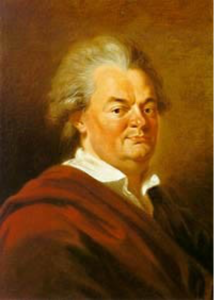To my piano
(Poet's title: An mein Klavier)
Set by Schubert:
D 342
Schubert did not set the stanzas in italics[1816 or 1817]
Sanftes Klavier,
Welche Entzückungen schaffest du mir,
Sanftes Klavier!
Wenn sich die Schönen
Tändelnd verwöhnen,
Weih ich mich dir,
Liebes Klavier.
Bin ich allein,
Hauch ich dir meine Empfindungen ein,
Himmlisch und rein.
Unschuld und Spiele,
Tugendgefühle
Sprechen aus dir,
Trautes Klavier.
Melancholie
Dunkelt der Seele der Spielerin nie,
Heiter ist sie.
Tanzende Docken,
Töne wie Glocken,
Flößen ins Blut
Rosigen Mut.
Sing’ ich dazu:
Goldener Flügel! welch himmlische Ruh
Lispelst mir du!
Tränen der Freude
Netzen die Saite;
Silberner Klang
Trägt den Gesang.
Tugend, ach! dir,
Unschuld, dir weih ich mein liebes Klavier!
Stimmet es mir!
Engel, ihr Hüter
Frommer Gemüter!
Jeder Ton sei
Himmel dir treu!
Rausche, o Ton,
Unter geflügelten Fingern davon!
Preise den Sohn,
Den mit Gesängen
Der Sphären, von Klängen
Der Harfen belebt,
Der Seraph erhebt.
Sanftes Klavier!
Welche Entzückungen schaffest du mir,
Goldnes Klavier!
Wenn mich im Leben
Sorgen umschweben,
Töne du mir,
Trautes Klavier!
Gentle piano,
What delights you create for me,
Gentle piano!
While beauties
Spoil themselves with dalliances,
I devote myself to you,
Beloved piano!
If I am alone,
I breathe out my emotions to you,
Heavenly and pure.
Innocence and play,
Feelings of virtue
Speak out of you,
Devoted piano!
Melancholy
Never darkens the soul of the player;
She is cheerful.
Dancing jacks,
Bell-like notes,
Flow into the blood,
Causing sanguine feelings.
If I sing along,
Golden instrument, what heavenly peace
You whisper to me!
Tears of joy
Moisten the strings;
A silver sound
Carries the song.
Virtue, oh you!
Innocence, to you I dedicate my beloved piano;
Make it sound for me,
Angels, you guardians,
With a pious disposition;
May each note be
True to you, heaven.
Note, ring out
From flying fingers!
Praise the Son,
The one exalted by the music
Of the spheres, enlivened by the sounds
Of harps,
Exalted by the seraph.
Gentle piano,
What delights you create for me,
Golden piano!
When in my life
Cares hover around me,
Resound for me,
Devoted piano!
All translations into English that appear on this website, unless otherwise stated, are by Malcolm Wren. You are free to use them on condition that you acknowledge Malcolm Wren as the translator and schubertsong.uk as the source. Unless otherwise stated, the comments and essays that appear after the texts and translations are by Malcolm Wren and are © Copyright.
☙
Themes and images in this text:
Being solitary, alone and lonely Breath and breathing Gold Joy Pianos and keyboards Silver Songs (general) Sounds Stringed instruments (unspecified) Tears and crying Wet and dry Whispering Wings
One of Schubart’s titles for this text was ‘Serafina an ihr Klavier‘ (Serafina to her keyboard instrument). The German word Klavier (as in the English ‘clavichord’) derives from the Latin ‘clavis’ (a key), so it could refer to any type of keyboard instrument, but is usually used for pianos generally (either a fortepiano, as envisaged by the poet, or a pianoforte by the time Schubert set the text to music). Another untranslatable word from the text is Flügel, the usual German term for a grand piano, since the literal meaning of the word is ‘wing’ (a reference to the shape of the instrument). When Serafina says that her golden instrument offers her heavenly peace (Goldener Flügel, welch’ himmlische Ruh’ /Lispelst mir du) she is punning on the idea of wings giving her lift.
The piano whispers to her, and she speaks of ‘breathing’ into it when she is singing along to her own accompaniment. She also notes that tears of joy fall onto the piano strings. There are therefore elements of all the major instrumental groups: percussion (keyboard), wind and strings. Just as her instrument can produce a full range of music, it also enables her to experience a wide range of emotions. It is a familiar, devoted friend, with whom she can share confidences (in contrast to the constrained world in which Serafina would have lived, where she would be expected never to show emotion or express her own desires or longings). Its sound is both silver (bright and charming?) and golden (warm and satisfying?). It (and she) can play soft and loud, it is truly a fortepiano.
☙
Original Spelling An mein Klavier Sanftes Klavier! Welche Entzückungen schaffest du mir, Sanftes Klavier! Wenn sich die Schönen Tändelnd verwöhnen, Weih' ich mich dir, Liebes Klavier! Bin ich allein, Hauch' ich dir meine Empfindungen ein, Himmlisch und rein. Unschuld und Spiele, Tugendgefühle, Sprechen aus dir, Trautes Klavier! Melancholie Dunkelt der Seele der Spielerin nie, Heiter ist sie. Tanzende Docken, Töne wie Glocken, Flößen in's Blut Rosigen Muth. Sing' ich dazu, Goldener Flügel! welch himmlische Ruh Lispelst mir du! Thränen der Freude Netzen die Saite; Silberner Klang Trägt den Gesang. Tugend, ach! dir, Unschuld, dir weih´ ich mein liebes Klavier! Stimmet es mir! Engel, ihr Hüter Frommer Gemüther! Jeder Ton sey Himmel dir treu! Rausche, o Ton, Unter geflügelten Fingern davon! Preise den Sohn, Den mit Gesängen Der Sphären, von Klängen Der Harfen belebt, Der Seraph erhebt. Sanftes Klavier, Welche Entzückungen schaffest du mir, Goldnes Klavier! Wenn mich im Leben Sorgen umschweben, Töne du mir, Trautes Klavier!
Confirmed by Peter Rastl with Schubert’s source, Chr. Daniel Friedrich Schubarts Gedichte aus dem Kerker. Mit allerhöchst-gnädigst Kaiserl. Privilegio. Carlsruhe, bey Christian Gottlieb Schmieder 1785, pages 300-301; with Christian Friedrich Daniel Schubarts sämtliche Gedichte. Von ihm selbst herausgegeben. Zweiter Band. Stuttgart, in der Buchdruckerei der Herzoglichen Hohen Carlsschule, 1786, pages 211-213; and with Christian Friedrich Daniel Schubart’s Gedichte. Herausgegeben von seinem Sohne Ludwig Schubart. Zweiter Theil. Frankfurt am Main 1802, bey J. C. Hermann, pages 84-86.
Note: The poem’s title An mein Klavier in the 1785 edition is changed to Serafina an ihr Klavier (Serafina to her piano) in the later editions.
To see an early edition of the text, go to page 300 [316 von 324] here: http://digital.onb.ac.at/OnbViewer/viewer.faces?doc=ABO_%2BZ200860409


